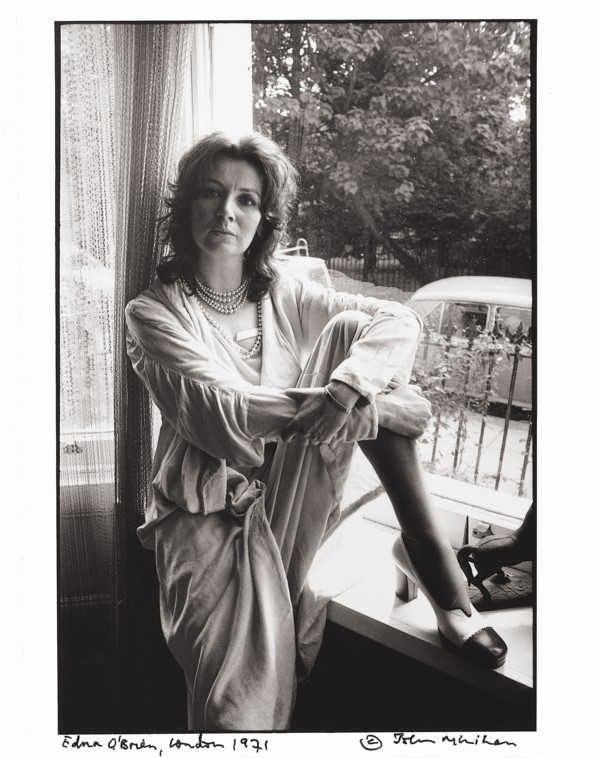You’d be forgiven for thinking you knew Edna O’Brien from her tales of passionate, unrepentent women. Her early career, after all, reads like a masterclass in succès de scandale – books censored, burned...
You’d be forgiven for thinking you knew Edna O’Brien from her tales of passionate, unrepentent women. Her early career, after all, reads like a masterclass in succès de scandale – books censored, burned – and every novel since is rumoured to have been written long-hand, in violet-coloured ink. In an interview with The Paris Review in 1984, she set out her belief that “one must be one’s own water diviner” and continues to mine her inexhaustable reserves of human understanding to reach the deepest and most fundamental rivulets within. Yet not one work from her heart-achingly masterful, thirty-strong oeuvre lays as much of O’Brien’s soul bare as Country Girl: A Memoir, released earlier this month to unanimous applause. Here, in a candid conversation with AnOther, she shares the story of its inception.
How did the process of writing something that is explicitly autobiographical affect the writing process?
Well you may think a lot of my fiction is autobiographical, it sometimes seems so. But for instance, in my first book, The Country Girls, I could have written six versions and they would have all been different, even though they would be drawing on the same landscape. So I didn't have that problem when I was writing my memoir of thinking, ‘oh I have written this in a story’. It’s not like that.
Did you anticipate the level of controversy that The Country Girls garnered?
No no no, I wouldn’t have dreamt of intending to do it! If I thought that I would have run away, I wouldn’t have been able to write it … It was all that ballyhoo or whatever the word is, but it was part of that time and part of that society and part of that censorship that went on. It did upset me, but it didn't stop me writing the next book and the next book and the next book…
In The Country Girls you describe sex in quite earthy terms. How do you feel about the way sex is treated today?
Well I hope there’s a shift, it would be lamentable to keep with the same. But it’s just like another universe isn’t it? The Country Girls was thought to be scandalous and it's not scandalous at all. It’s a much freer society now, sometimes for better, sometimes for worse. It’s more libidinous and to use the cliché with regard to sexuality now: anything goes. Sometimes, actually, to grievous disappointment in fiction.
"Perfection in the work or in life? It's very hard to manage either and it's impossible to manage both."
W. B. Yeats' early work shows the strain of striving for perfection. As he got older, he learned to embrace the uncertainty of things. Do you feel that you’re the same author today as you were?
This question I think, for any writer, is an important one: perfection in the work or in life? It's very hard to manage either and it's impossible to manage both. Yeats was quite lucky towards the end of his life, he lead a much more precarious, social and hard to believe, sexual sort of romping life. Living with words and living inwardly isn't exactly a happy or a normal state. I think it would be ideal for your body to be living as an athlete and your mind, as a writer. But that's not easy.
What books, what lines, resonate with you?
It's more a trunk or a suitcase and depends on who I’m reading. But Beckett, many of his lines and words are just… well they’re always with me. One of them, I don't quite know where it's from, it says: ‘you cried for night; it falls: now cry in darkness’. Well, having read that one, you can never forget it. I’m reading a lot of Beckett and I’m re-ignited and re-amazed and re-enthralled and re-educated and re-everythinged by him.
Who are the other authors that you find yourself coming back to over and over again again?
John Donne, Joyce and Chekov, in a totally different way. Chekov, I always say, is like air or very fine rain, it’s so undemonstrative, it’s so unfierce, but it creeps into you because it’s so profound and so true.
When were you happiest this year?
Well I think my nicest day this year was when I went to the football final in Wembley. That was a long way from literature and I tell you, I loved it. I love football, I watch it on television, but to be there, watching it with 86,000 people all waving and swaying with happiness and delight...I would go every Saturday if I could.
Text by Nathalie Olah
Country Girl: A Memoir is out now, published by Faber & Faber.
